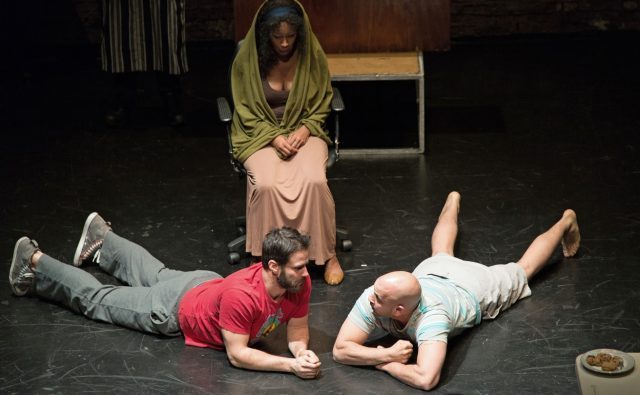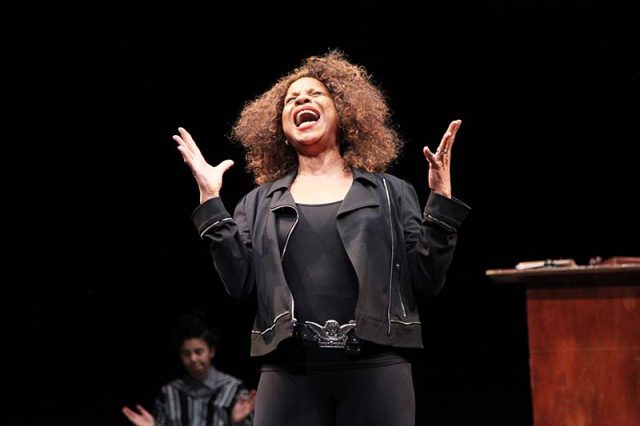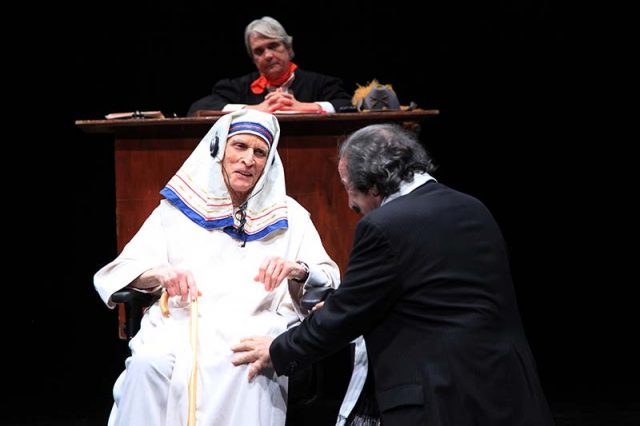
Two couples can’t reach a genuine understanding in God of Carnage (photo by Carol Rosegg)
GOD OF CARNAGE
Theatre Row
410 West 42nd St. between Ninth & Tenth Aves.
Tuesday – Sunday through May 20, $72.50
www.tbtb.org
“Why does everything always have to be so exhausting?” Veronica (Christiane Noll) asks in Theater Breaking Through Barriers’ (TBTB) splendid off-Broadway premiere of Yasmina Reza’s 2008 dark comedy, God of Carnage, running at Theatre Row through May 20. The prescient fifteen-year-old show feels even more relevant today as we deal with exhaustion of all kinds on a seemingly endless basis.
Before the actors take the stage, they identify themselves in voiceover: what they’re wearing and what the set looks like, the words projected onto the back wall, which Veronica explains “is composed of approximately twenty square and rectangular panels and is painted bright red. Because the panels are all different sizes and overlap each other, the wall presents as fractured with an illusion of depth to it. It is reminiscent of the cubism movement of the early twentieth century.” In this revival, “illusion of depth” and “cubism” would be two ways to describe what happens over the course of ninety minutes.
Founded in 1979, TBTB is “dedicated to advancing artists and developing audiences of people with disabilities and altering the misperceptions surrounding disability”; thus, some of the actors have disabilities (that are not necessarily noticeable and aren’t the point), and the dialogue is projected through the entire play for those who are hard of hearing (though often a distracting second or two behind the action). God of Carnage is an excellent choice for TBTB, as part of the plot involves a drug that might be causing side effects that mimic certain disabilities.
Michael Novak (Gabe Fazio), who runs a wholesale household goods company, and his wife, Veronica, a writer who works in an art history bookstore, have invited over Alan Raleigh (David Burtka), a hotshot corporate lawyer, and his wife, Annette (Carey Cox), who’s in wealth management, to discuss an unfortunate situation: The Raleighs’ eleven-year-old son, Benjamin, struck the Novaks’ eleven-year-old, Henry, across the face with a stick in Cobble Hill Park, knocking out two of his teeth. For legal and insurance purposes, the parents are drafting a document explaining precisely what happened. The disagreements begin from the very start, when Veronica states that Benjamin was “armed with a stick” but Alan objects to that word and they decide on “furnished” instead.
The narrative plays out like a courtroom drama as the audience shifts its sympathies among the four characters, who eventually all show their true colors, some of them unexpected. Alan spends much of his time on his cell phone, handling a crisis for a pharmaceutical company in a bind because of serious issues with one of its drugs. He remains in the living room, speaking loudly to his colleagues and clients, oblivious to whether or not everyone hears what he’s saying because he’s sure that it’s far more important than arguing about a couple of boys being boys.

Gabe Fazio, David Burtka, Christiane Noll, and Carey Cox star in off-Broadway debut of Tony-winning play (photo by Carol Rosegg)
Annette is furious at her husband’s disrespect and neglect and is at first insistent that Benjamin must apologize in person to Henry. But as more facts come out, she starts pulling back and pointing fingers. Veronica is appalled at this change, although she at times seems more concerned about her collection of rare art volumes and the book she’s writing on Sudan. Meanwhile, Michael sees nothing wrong with how he disposed of his daughter’s beloved hamster, while his mother keeps calling on the landline, worrying about her own health situation.
Every time the Raleighs get up to go, something happens to keep them in the living room, reminiscent of Luis Buñuel’s The Exterminating Angel, in which people at a dinner party are unable to leave. And as the two couples’ discussions get more combative — there’s even a debate over the homemade clafouti Veronica serves — the parents get more and more cruel as things devolve into mayhem.
Translated from the original French by Christopher Hampton, who has translated five of Reza’s plays, including the Tony-winning ‘Art,’ God of Carnage debuted on Broadway in February 2009 with an impressive cast: Jeff Daniels as Alan, Hope Davis as Annette, James Gandolfini as Michael, and Marcia Gay Harden as Veronica. All four actors were nominated for Tonys; Gay Harden won for Best Actress and Matthew Warchus for Best Director, and the show took home the Best Play prize. Roman Polanski’s 2011 film starred Christoph Waltz as Alan, Jodie Foster as Annette, John C. Reilly as Michael, and Kate Winslet as Veronica.
TBTB’s adaptation might not boast huge names, but it is a small gem that celebrates the sharp writing, which is filled with hilarious absurdities while turning modern-day Brooklyn parenting inside out. The show takes place on the cusp of the social media revolution, when bullying was still mostly limited to physical rather than online interaction. The Novaks and the Raleighs are practically the opposite of helicopter parents; at one point, when Annette criticizes her guests’ parenting skills, Alan gives her permission to say anything she wants to Benjamin, something that is unlikely to happen today, especially in the Cobble Hill area.
Bert Scott’s set is centered by an off-white sofa and matching armchair, with a glass coffee table, beige rug, utility table with bottles of alcohol, Parson chair, and end table with a vase of yellow tulips; the soft lighting and projections are by Samuel J. Biondolillo, with sound by Eric Nightengale and appropriate bourgeois Brooklyn costumes by Olivia V. Hern.
Burtka (Gypsy, It Shoulda Been You) is strong and unflappable as Alan, a selfish man who cares more about his job than his wife and son. “I really wish you would just turn off your cell phone and focus on your family for a change,” Annette yells at him during TBTB’s added introduction. “There is nothing worse than someone who is so addicted to their cell phone that they can’t shut it off for a time and focus on what is right in front of them.” Cell-phone rudeness has only gotten worse since 2008, so Reza was right on target with Alan. When Annette says under her breath to the audience, “Blah blah blah, it’s the same nonsense all the time,” Alan asks, “Who are you talking to?,” as he is unable to see anyone else but himself, including the audience. (Echoing Alan and Annette, when Michael describes himself to the audience in the guise of testing out a new voice recorder, Veronica grumbles, “Michael, what are you doing?”)
Cox (The Glass Menagerie, The Handmaid’s Tale) kicks it into high gear as Annette, who is getting sick and tired of being pushed around by everyone because of her generally mousey demeanor; she is like the hamster, ready to break free from Alan, who calls her “Woof-woof” as if she is his pet. Meanwhile, Fazio (The Last Days of Judas Iscariot, The Good Nurse) captures Michael’s unpredictability, the character drifting in his own world, reaching for the fancy rum when things get rough. And Tony nominee Noll (Ragtime, Chaplin) holds nothing back as Veronica, whose carefully orchestrated existence is coming unhinged despite her best efforts to remain in control, even regarding her clafouti recipe.
TBTB artistic director Nicholas Viselli, who just received a Legend of Off-Broadway Award from the Off Broadway Alliance, builds the narrative at an ever-increasing pace as the Novaks and the Raleighs discover that they might be more alike than they ever imagined. No one is left unscathed in this spirited tale that begins as a taut psychological drama and slowly evolves into all-out physical chaos. These scenes of carnage may have been penned fifteen years ago, but in this stinging production it feels like they could have been written yesterday.


